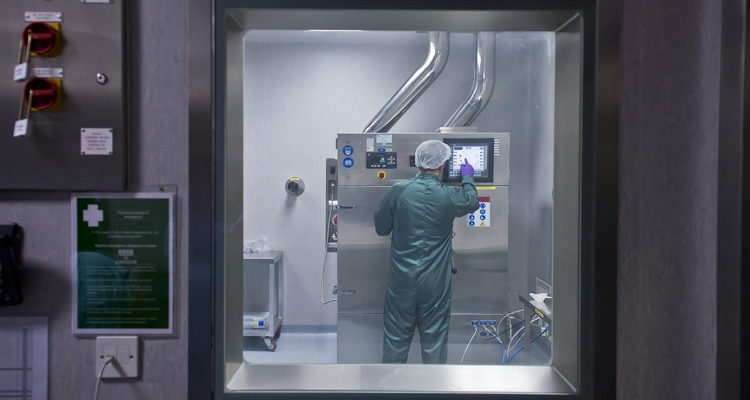The UK government has initially pre-ordered a reported 90 million COVID-19 vaccines from Pfizer and each person will need two doses, three weeks apart to guarantee immunity, it has been reported. That means that covers around 45 million people in the UK population out of a total of 66.6m (2019 figures).
That means 45 million people at high risk for contracting the virus, predominately the elderly, those in care homes and NHS staff, will be the first to receive the vaccine. However, the vaccine in its current state needs to be stored in -80oc and the current infrastructure across GP surgeries, hospitals and pharmacies can only store vaccines at between 2-8oc.
This is not just a problem for the UK, but the entire global healthcare system.
Just as the news of a vaccine heats up, the ability to store and deploy it has cooled down the excitement of major deployment come this December.
“In order to protect both efficacy and safety, most vaccines must be maintained at a specific temperature, normally 2-8C. The new two-shot vaccine from Pfizer has to be maintained at -80°C – nowhere on the planet does the logistical capacity exist to distribute vaccines at this temperature and volume without massive investment.”
Prof Toby Peters, Professor of Cold Economy, University of Birmingham
Call for global cool chain investment
Unless Pfizer can develop a way to store the vaccine in the temperature range within the infrastructure already available, only specialised clinics will be able to store and administer the vaccine. That could delay deployment and put some isolated or rural areas of the UK country at risk of not getting the vaccine before the end of the year if storage facilities are not nearby or people have to travel further to gain access.
Finding innovative ways to bring vaccines to these areas and to care homes directly could help expedite the national NHS vaccine campaign.
“Efforts to find a lasting solution to the COVID-19 pandemic have been focused on developing, testing and manufacturing at scale an effective vaccine. However, little attention has been given to what is needed to distribute it rapidly at scale,” said Prof Toby Peters, Professor of Cold Economy, University of Birmingham.
“In order to protect both efficacy and safety, most vaccines must be maintained at a specific temperature, normally 2-8C. The new two-shot vaccine from Pfizer has to be maintained at -80°C – nowhere on the planet does the logistical capacity exist to distribute vaccines at this temperature and volume without massive investment,” he said.

This glitch could be a major opportunity for those businesses, large and small, in the cold storage and the wider cool chain sector. But only if another alternative vaccine with higher temperature storage capabilities is not developed before the end of the year.
Those areas of the world where refrigeration is scarce will be even more at risk of not having rapid access to the vaccine.
Too cold to handle?
“The problem is particularly acute in the Global South where many rural villages don’t even have a working vaccine fridge,” Peters warns. “We must take this once-in-a lifetime opportunity to create sustainable solutions for COVID-19 vaccine deployment that also can deliver resilient and sustainable health cold-chain systems, including ultra-low temperature,” said Peters.
“Temperature management at -80°C is a tough challenge but we cannot allow this to become, by default, a divided solution. Research suggests equitable distribution of the COVID-19 vaccine globally would prevent 61% of subsequent deaths, compared to 33% of deaths avoided if it is distributed to high-income countries first,” he said.
Dr Jonathan Stoye, Group Leader, Retrovirus-Host Interactions Laboratory, The Francis Crick Institute, also sees the vaccine’s storage capabilities as a major inhibitor for its success in its current state.
“One can foresee at least two drawbacks to the Pfizer vaccine, even assuming it works as well as we currently think. First, it requires two injections for full effectiveness, spaced 3 to 4 weeks apart. Second, it needs to be stored at -80 degrees before use. Both properties will severely complicate administering the vaccine to many recipients, particularly in countries which are warm and have less developed cold chains.
There is therefore every reason to continue the search for novel vaccines particularly those requiring only one dose which can be distributed in powder form and reconstituted prior to use,” said Stoye.
The Oxford University/Astra Zeneca vaccine trials are also ongoing with promising news coming out of India from the Serum Institute of India, the world’s largest vaccine manufacturer by volume. However, temperature and transport will also be an issue for that vaccine.
If you want to really get to know more about the cold chain sector and the global business opportunties, the WHO has published a report which you can download here.
According to a Guardian report, there will be 100m doses of the Pfizer vaccine going to the US, 200m to the EU and around 40m to the UK. Countries in South America and the Asia-Pacific region have also preordered the vaccine. Pfizer plans to supply 50m doses globally this year, and a further 1.3bn doses next year.
That shows that just a small population in the world will actually get vaccinated this year or even next based on annual manufacturing capacity.
The report stated that centres in Kalamazoo, Michigan in the US and Puurs in Belgium have already been making hundreds of thousands of doses of the vaccine. Other freezer farms in Pleasant Prairie, Wisconsin, and in Karlsruhe, Germany, are on standby to provide extra storage capacity.
“From there, the vaccine will be transported in suitcase-sized storage boxes packed with dry ice (solid carbon dioxide) that have been specially designed by Pfizer. Each reusable box can hold between 1,000 and 5,000 doses at ultra-cold temperatures for up to 10 days. Pfizer said its vaccine can be kept for up to five days at fridge temperatures of 2-8C,” said the report.



